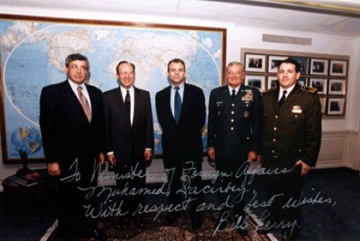

Holbrooke was in my room waiting for me before even I had checked into it. And, he already knew of my/our demand for NATO action and lifting the siege of Sarajevo before we would continue the talks, less than 30 minutes after I had spoken to the press in front of the hotel.
Holbrooke demanded: “you cannot do that, we have to keep moving forward.” I responded that we were not prepared to do anything more until… He looked at me with what I perceived uncertainty: “We are going to do something, but we must take the opportunity while in Paris to move forward.”
At that moment I figured our the President Izetbegovic had refused to see him and had sent him to speak to me. Holbrooke had set up meetings and at least one dinner at the US Embassy, and he was eager to impress US Ambassador Pamela Harriman (wife of the iconic American diplomat from when Holbrooke was a junior State Department officer at the conclusion of the Vietnam War). Think he was looking to make himself look more relevant than French President Chirac in his capital.
A Bluff that Holbrooke Converted into his Own?
Holbrooke left my room a bit ruffled, but frankly not as upset as one might have expected in view of my/our refusal. Then, I though that I had brilliantly bluffed him, but in hindsight I have come to believe that he was only to hear my/our conditions for resuming the talks so that he could convey him to his bosses and allies. He saw it as an opportunity to transform my bluff into his own vis-à-vis the US Pentagon and other Contact Group/NATO allies. Even if I dislike much of Holbrooke’s legacy in BiH and the region, it was this type of tactic and ability to quickly change turns that even his adversaries came to respect. He probably saw my/our demand to be transformed in his opportunity to have his finger on the NATO trigger.
Holbrooke’s Opportunity for Redemption?
Was it also in his eyes an opportunity for redemption after they had allowed Mladic to march in Srebrenica only 50 days earlier? - I don’t know if he saw it that way then or felt particularly burdened. He was not a person with a long memory or one who would be weighed down by a heavy conscience. For all his apparent contrition on Srebrenica or Republika Srpska, he not only failed to remedy even his admitted mistakes but became an obstacle for change and redemption.
President Izetbegovic, Minister Muratovic, Ambassador Kovac and I were to have a working lunch with President Chirac and his team. While the “bluff” hopefully would deliver results with Holbrooke and Washington, we felt that this was a fresh opportunity with a new French President. Any change to Mitterand would be preferable.
Mitterrand the Bigot:
Mitterrand was not pr-Serb, but anti-Muslim. His arrogance only appeared to further infuse the worst prejudices of a young Nazi collaborator in Vichy France. I had more than one opportunity to see evidence of his immense ego depositing itself upon the formulation of French policy.
Marginalizing NATO:
Mitterrand was also anti-American. His unexpected journey to Sarajevo in the early summer of 1992 was with purpose of preempting the US at a critical time from undertaking any military measures to confront the emerging siege, aggression and genocide. Mitterrand was busy at that time formulating a new European Defense methodology with the explicit purpose of excluding the US and marginalizing NATO.
The Bosnian Patriot - Ambassador Nikola Kovac:
The defining moment in my recollection of Mitterrand was a meeting in the same Presidential palace where we were having in August 1995 lunch with Chirac. Prime Minister Silajdzic, Ambassador Kovac (Photo Above),and I in the late spring of 1994 there to plead for some more decisive action to stop the then strangulation of Gorazde. Mitterrand abruptly interrupted Silajdzic and started to blame the BiH Government or as he designated the “Muslims” for all the wrongs and conflict in BiH. He clearly projected “Muslims” as outsiders to Europe, including in the Balkans. When I countered that we were the UN recognized, legitimate government which represented the aspirations of a multi-ethnic BiH and pointed out to him that the BiH Ambassador to his capital was an ethnic Serb, he became visibly annoyed. In response to a thoughtful explanation by Ambassador Kovac as to why he was loyal to and representing the Sarajevo Government, Mitterrand called him then a “traitor to the Serb people.”
In the 16+ years since that meeting I have also hoped that a new BiH would live-up to the committed loyalty of an Ambassador Kovac. Unfortunately, it seems to have only gotten worse in terms of defining ourselves and the country in ethnic/religious terms but in a manner to the exclusion of others. However, Mitterrand’s brand of bigotry has reminded me of the worst that Europe has had to offer from the Holocaust to the wars in the former Yugoslavia. As I testified over a 40 day period in the trial before the ICTY of Belgrade’s military chief General Momcilo Perisic, I was asked regarding my position on Mitterrand’s views of causes and events by defense counsel for the accused – it was the opportune moment to define Mitterrand as a “bigot” on the judicial record.
Meeting with Chirac was an opportunity to press France to turn the course away from Mitterrand’s policies. I’m convinced that also much of what was done or not done in saving Srebrenica by General Bernard Janvier was part of the influence of Mitterrand and inertia of his policies. It was confirmed implicitly by response to Minister Hasan Muratovic’s verbal assault upon Janvier in conversation with Chirac.
Chirac Agrees to a Military Response:
In his rather direct style and certainly in this instance with justification, Muratovic assaulted Janvier’s character as well as record in BiH. Rather than defend the French General, Chirac and his advisers did not even bother to put up the veneer. Rather, Chirac and his key foreign policy adviser Jean David Levitte agreed that some military response was necessary after the latest massacre in the Sarajevo marketplace. They however favored that this be led by the UN mandated troops on the ground that had only been recently re-enforced by heavy guns, (in the context of the “Rapid Reaction Force”). We were skeptical that this would be adequate without NATO air action, but it was determined that Levitte and I would remain in contact to outline options.
Bernard Henri Levy 7 Gilles Herzog:
Holbrooke in the meantime had been desperate to reach us. He was not part of the Chirac meeting and no reason for him to be. It made him a bit anxious I think not to be in complete charge. He was persistent that Izetbegovic and I come to dinner that evening at the US Embassy, with ambassador Pamela Harriman as our host. President Izetbegovic agreed that I would go, but that he would not. He would not engage unless and until there was a NATO response – and it was the President that was the symbolic prize for the dinner after all even if he would not partake of the French wine. I proposed that we also invite BiH’s two good friends in Paris, Bernard Henri Levy and Gilles Herzog.
Both Bernard and Gilles were animated and impassioned in their dinner conversation on behalf of the values that BiH represented. Holbrooke was just impatient. Ambassador Harriman was a gracious host, but I think a bit irritated by Holbrooke’s constant excursions to the phone.
Keeping the President out of reach as the Prize:
Holbrooke kept asking me when the President would come. I kept repeating not until NATO action had been initiated. In fact President Izetbegovic was also becoming impatient. It concerned me, as I had become leery of President Izetbegovic becoming too predictable and forthcoming with respect to the mediators. As I have mentioned previously, he viewed the process as finding a deal somewhere is a series of compromises. In my thinking, it was an all or nothing moment - whether NATO would act here and with resolve to change the fundamental leverage on the ground. Undoubtedly it was not consistent with his style to be the lure in effect. Though it was not comfortable for him, think he did though implicitly understand that he could only detract from our leverage at that specific moment rather than add with his direct involvement in discussions. Izetbegovic went on a long walk around Paris – no particular destination but just meandering through the dark streets with a small entourage and much bigger French security escort.
It was almost midnight, and Holbrooke asked me to take a call and then a second and then a third from Washington We moved to an office in the second floor of the American Embassy. A sequence of US officials assured me that we would be satisfied with the NATO action that would soon be underway. Anthony Lake, Warren Christopher, Strobe Talbot as well as Madeline Albright were all on alert. I did not have much rapport with Christopher although Lake was considerably more of a personality and foreign policy intellect. Strobe had become a more frequent interlocutor. They all wanted to know where Izetbegovic was.
Of course he was only a few yards from the US embassy door – he was not necessarily going to come in, but he probably felt that he had to be physically close. Holbrooke was anxious though to show-off Izetbegovic to his bosses in Washington. Undoubtedly he had also pressed for the NATO air action. Having Izetbegovic at the US embassy would show that NATO action was the right course, but even more importantly from his perspective, that Holbrooke was in charge. President Izetbegovic finally did come through the door, and Holbrooke made certain that Washington knew it. He handed Izetbegovic the phone asking him to say hello to Warren Christopher. We had been assured that the planes were already in the air and within an hour that early morning of August 30, 1995, NATO intervention over BiH was confirmed.
Sleeping well? I did not sleep more than 3-5 hours a night during my service on behalf of BiH, and my sleep was frequently broken by emergencies, media calls or the simple dominant consideration: could I do more? That night I did not sleep much either receiving calls, but I felt like I was part of something that had altered the course after 40+ months of frustration as well as suffering.
Bottom Photo - Meet in US Pentagon with US Secretary of Defense William Perry and US Military Chief of Staff General John Shalikashvili. Accompanying Foreign Minister Muhamed Sacirbey are BiH Ambassador Sven Alkalaj and Brig. General Selmo Cikotic.
Part 1 – " Road to Dayton" -
diplomaticallyincorrect.org/films/blog_post/the-road-to-dayton-by-ambassador-muhamed-sacirbey-part-1/41938
Part 2 -
diplomaticallyincorrect.org/films/blog_post/road-to-dayton-albright-holbrooke-part-2-by-ambassador-muhamed-sacirbey/41977
Part 3 -
diplomaticallyincorrect.org/films/blog_post/road-to-dayton-the-islamic-card-nato-air-strikes-part-3-by-ambassador-muhamed-sacirbey/42056
By Ambassador Muhamed Sacirbey
Facebook – Become a Fan at “Bosnia TV” and/or “Diplomatically Incorrect”
Twitter - Follow us at DiplomaticallyX
“Srebrenica Genocide” Channel -
diplomaticallyincorrect.org/c/the-genocide-of-srebrenica/most_recent/6



